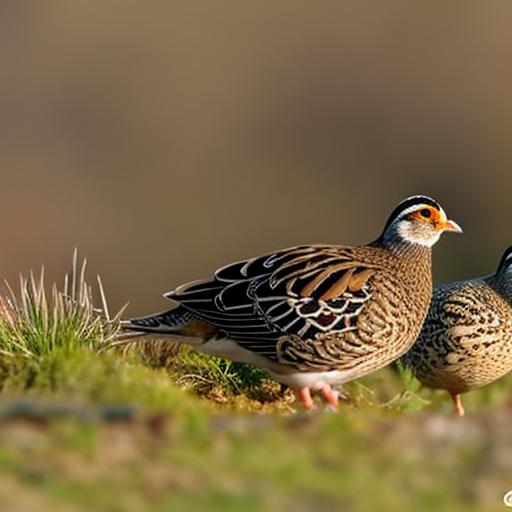Quails are small, ground-dwelling birds that are known for their social behavior and strong flocking instincts. They are highly social birds and prefer to live in groups, known as coveys, for safety and companionship. Quails are also known for their strong flight response, which means they are easily startled and will take flight at the slightest disturbance. Understanding these behaviors is crucial for providing the right environment for quails to thrive.
In terms of their needs, quails require a habitat that provides them with access to food, water, shelter, and space to roam. They are ground-dwelling birds, so they prefer habitats with low-lying vegetation and open spaces. Quails are also known for their dust bathing behavior, which helps them keep their feathers clean and free from parasites. Providing a suitable area for dust bathing is essential for their well-being. Additionally, quails are omnivorous birds, so they require a diet that includes a mix of seeds, insects, and vegetation. Understanding these basic behaviors and needs is essential for creating a suitable environment for quails.
Quails are highly social birds that prefer to live in groups for safety and companionship. They are easily startled and have a strong flight response. Understanding these behaviors is crucial for providing the right environment for quails to thrive. Quails require a habitat that provides them with access to food, water, shelter, and space to roam. They are ground-dwelling birds, so they prefer habitats with low-lying vegetation and open spaces. Quails are also known for their dust bathing behavior, which helps them keep their feathers clean and free from parasites. Providing a suitable area for dust bathing is essential for their well-being. Additionally, quails are omnivorous birds, so they require a diet that includes a mix of seeds, insects, and vegetation. Understanding these basic behaviors and needs is essential for creating a suitable environment for quails.
Key Takeaways
- Quail are social birds that require companionship and space to exhibit natural behaviors.
- Factors such as available space, food and water sources, and predator presence should be considered when determining quail numbers.
- Different purposes, such as hunting or breeding, require different ideal quail numbers.
- Quail require a minimum of 1 square foot of space per bird in a coop, and 2-3 square feet per bird in an outdoor pen.
- Managing quail flock dynamics involves providing adequate space, food, and shelter, and monitoring for signs of aggression or stress.
- To calculate quail population for sustainable breeding, consider factors such as genetic diversity, space, and resources.
- Tips for keeping a healthy and happy quail flock include providing a balanced diet, clean living conditions, and regular health checks.
Factors to Consider When Determining Quail Numbers
When determining the number of quails to keep, there are several factors to consider to ensure the well-being of the birds and the sustainability of the flock. One of the most important factors is the size of the available space. Quails require ample space to roam and forage, so overcrowding can lead to stress, aggression, and poor health. It’s essential to calculate the appropriate stocking density based on the available space to ensure that the quails have enough room to exhibit natural behaviors and maintain a healthy social structure.
Another factor to consider is the purpose of keeping quails. Whether it’s for egg production, meat production, or as pets, the intended purpose will influence the number of quails to keep. For example, if the goal is egg production, a larger flock may be necessary to meet the demand for eggs. On the other hand, if the goal is to keep quails as pets, a smaller flock size may be more suitable for individual attention and care. Additionally, considering the resources available for feeding and caring for the quails is crucial in determining the appropriate number to keep.
Other factors to consider include the breed of quails, their social dynamics, and the level of human interaction they will receive. Different quail breeds have varying space requirements and social behaviors, so it’s important to research the specific needs of the chosen breed. Understanding the social dynamics of quails is also crucial in determining the appropriate flock size to prevent overcrowding and aggression. Lastly, considering the level of human interaction and care available is important for ensuring the well-being of the quails.
When determining the number of quails to keep, it’s important to consider factors such as available space, the purpose of keeping quails, resources for feeding and care, quail breed, social dynamics, and human interaction. Calculating the appropriate stocking density based on available space is crucial to ensure that quails have enough room to roam and exhibit natural behaviors. The purpose of keeping quails will influence the number of quails to keep, whether it’s for egg production, meat production, or as pets. Additionally, considering resources available for feeding and caring for the quails is crucial in determining the appropriate number to keep. Different quail breeds have varying space requirements and social behaviors, so it’s important to research the specific needs of the chosen breed. Understanding the social dynamics of quails is also crucial in determining the appropriate flock size to prevent overcrowding and aggression. Lastly, considering the level of human interaction and care available is important for ensuring the well-being of the quails.
Ideal Quail Numbers for Different Purposes
The ideal number of quails to keep varies depending on the intended purpose, whether it’s for egg production, meat production, or as pets. For egg production, a larger flock may be necessary to meet the demand for eggs. Quails are prolific layers and can produce a significant number of eggs, so keeping a larger flock can ensure an ample supply of eggs for consumption or sale. On the other hand, for meat production, the ideal number of quails will depend on the desired yield of meat. Keeping a larger flock can result in a higher yield of meat for consumption or sale.
For those keeping quails as pets or for ornamental purposes, a smaller flock size may be more suitable for individual attention and care. Smaller flocks allow for closer human interaction and can be easier to manage in terms of feeding and care. Additionally, smaller flocks can be more manageable in terms of space requirements and housing needs.
It’s important to consider the intended purpose when determining the ideal number of quails to keep. For egg production, a larger flock may be necessary to meet the demand for eggs. Quails are prolific layers and can produce a significant number of eggs, so keeping a larger flock can ensure an ample supply of eggs for consumption or sale. For meat production, the ideal number of quails will depend on the desired yield of meat. Keeping a larger flock can result in a higher yield of meat for consumption or sale. For those keeping quails as pets or for ornamental purposes, a smaller flock size may be more suitable for individual attention and care. Smaller flocks allow for closer human interaction and can be easier to manage in terms of feeding and care.
Space Requirements for Quail
Quails require ample space to roam and exhibit natural behaviors such as dust bathing, foraging, and socializing. The space requirements for quails will vary depending on factors such as breed, flock size, and intended purpose. As a general guideline, it’s recommended to provide at least 1 square foot of space per quail in indoor housing setups. For outdoor enclosures or free-range systems, providing even more space is beneficial for allowing quails to roam and forage freely.
When calculating space requirements for quails, it’s important to consider not only floor space but also vertical space. Quails are known for their strong flight response and will take flight at the slightest disturbance, so providing adequate vertical space is essential for preventing injuries and stress. Additionally, providing hiding spots and shelters within the enclosure can help quails feel secure and reduce aggression within the flock.
It’s important to provide ample space for quails to roam and exhibit natural behaviors such as dust bathing, foraging, and socializing. The space requirements will vary depending on factors such as breed, flock size, and intended purpose. As a general guideline, it’s recommended to provide at least 1 square foot of space per quail in indoor housing setups. For outdoor enclosures or free-range systems, providing even more space is beneficial for allowing quails to roam and forage freely. When calculating space requirements for quails, it’s important to consider not only floor space but also vertical space. Providing adequate vertical space is essential for preventing injuries and stress due to their strong flight response.
Managing Quail Flock Dynamics
Managing quail flock dynamics is crucial for maintaining a harmonious and healthy flock. Quails are highly social birds with strong flocking instincts, but they can also exhibit aggressive behaviors within the flock if not managed properly. One key aspect of managing flock dynamics is providing adequate space and resources to prevent competition and aggression among the birds.
Introducing new birds into an existing flock can also impact flock dynamics. It’s important to carefully introduce new birds to prevent aggression and establish a new pecking order within the flock. Providing multiple feeding and watering stations can help reduce competition for resources and minimize aggressive behaviors.
Observing the behavior of individual birds within the flock is also important for identifying any signs of stress or aggression. Separating aggressive birds or providing hiding spots within the enclosure can help reduce conflict within the flock. Additionally, ensuring that all birds have access to food, water, and shelter is essential for maintaining a healthy social structure within the flock.
Managing quail flock dynamics is crucial for maintaining a harmonious and healthy flock. Providing adequate space and resources is key in preventing competition and aggression among the birds. Introducing new birds into an existing flock should be done carefully to prevent aggression and establish a new pecking order within the flock. Providing multiple feeding and watering stations can help reduce competition for resources and minimize aggressive behaviors. Observing the behavior of individual birds within the flock is important for identifying any signs of stress or aggression. Separating aggressive birds or providing hiding spots within the enclosure can help reduce conflict within the flock.
How to Calculate Quail Population for Sustainable Breeding

Calculating quail population for sustainable breeding involves considering factors such as genetic diversity, breeding ratios, and population growth rates. Maintaining genetic diversity within a breeding population is crucial for preventing inbreeding depression and ensuring healthy offspring. It’s important to keep track of individual birds’ lineage and avoid breeding closely related individuals.
Breeding ratios play a key role in sustainable breeding practices. The ideal breeding ratio will depend on factors such as age, fertility rates, and genetic diversity within the population. It’s important to monitor breeding pairs closely to ensure successful mating and egg production.
Population growth rates should also be considered when calculating quail population for sustainable breeding. Monitoring population growth over time can help prevent overcrowding and ensure that resources are sufficient to support the growing population.
Maintaining genetic diversity within a breeding population is crucial for preventing inbreeding depression and ensuring healthy offspring. It’s important to keep track of individual birds’ lineage and avoid breeding closely related individuals. The ideal breeding ratio will depend on factors such as age, fertility rates, and genetic diversity within the population. It’s important to monitor breeding pairs closely to ensure successful mating and egg production.
Tips for Keeping a Healthy and Happy Quail Flock
Keeping a healthy and happy quail flock involves providing a suitable environment with access to food, water, shelter, and space to roam. Regularly cleaning their living quarters is essential for preventing disease and maintaining hygiene within the flock.
Monitoring their behavior closely can help identify any signs of stress or illness early on. Providing enrichment activities such as dust bathing areas or hiding spots can help keep them mentally stimulated and reduce boredom within the flock.
Ensuring that all birds have access to food and water is crucial for maintaining their health and well-being. Providing a balanced diet that includes seeds, insects, vegetation, and grit will help meet their nutritional needs.
Regular health checks by a veterinarian can help identify any potential health issues early on and ensure that they receive proper care when needed.
Keeping a healthy and happy quail flock involves providing a suitable environment with access to food, water, shelter, and space to roam. Regularly cleaning their living quarters is essential for preventing disease and maintaining hygiene within the flock. Monitoring their behavior closely can help identify any signs of stress or illness early on. Providing enrichment activities such as dust bathing areas or hiding spots can help keep them mentally stimulated and reduce boredom within the flock.
In conclusion, understanding quail behavior and needs is essential for providing a suitable environment where they can thrive. Factors such as available space, intended purpose, breed characteristics, social dynamics, human interaction level should be considered when determining quail numbers. Providing adequate space with access to food, water, shelter is crucial in managing quail flock dynamics while calculating population growth rates is essential in sustainable breeding practices. Lastly keeping a healthy happy quail flock involves regular cleaning monitoring behavior closely providing enrichment activities ensuring access to food water balanced diet regular health checks by veterinarian.
In conclusion, understanding quail behavior and needs is essential for providing a suitable environment where they can thrive. Factors such as available space, intended purpose, breed characteristics, social dynamics, and human interaction level should be considered when determining quail numbers. Providing adequate space with access to food, water, and shelter is crucial in managing quail flock dynamics, while calculating population growth rates is essential in sustainable breeding practices. Lastly, keeping a healthy, happy quail flock involves regular cleaning, monitoring behavior closely, providing enrichment activities, ensuring access to a balanced diet and regular health checks by a veterinarian.
Sure, here’s the paragraph with the related article included as an tag:
“When considering how many quails to keep, it’s important to also think about the housing requirements for these birds. A large chicken coop can provide ample space for both chickens and quails, allowing them to coexist comfortably. If you’re looking for ideas on how to set up the interior of your coop to accommodate both species, this article on chicken coop interior ideas offers valuable insights. Additionally, the Producers Pride Sentinel Chicken Coop is a great option for creating a versatile and spacious living environment for your quails and chickens.”
FAQs
How many quails should I keep?
It is recommended to keep quails in a group of at least 5 to 6 birds. This helps to maintain a social structure and prevent loneliness or stress.
What is the minimum number of quails to keep for egg production?
For egg production, it is recommended to keep a minimum of 3 to 4 female quails per male. This ratio helps to ensure successful breeding and egg production.
Can I keep just one quail as a pet?
Quails are social birds and keeping just one quail as a pet is not recommended. They thrive in the company of other quails and may become stressed or lonely if kept alone.
What is the maximum number of quails to keep in a single enclosure?
The maximum number of quails to keep in a single enclosure depends on the size of the enclosure and the breed of quails. It is important to provide enough space for the quails to move around and exhibit natural behaviors.
How do I determine the right number of quails for my space and resources?
When determining the right number of quails to keep, consider the space available for the enclosure, the resources such as food and water, and the time and effort required for care and maintenance. It is important to provide adequate space and resources for the well-being of the quails.
Meet Walter, the feathered-friend fanatic of Florida! Nestled in the sunshine state, Walter struts through life with his feathered companions, clucking his way to happiness. With a coop that’s fancier than a five-star hotel, he’s the Don Juan of the chicken world. When he’s not teaching his hens to do the cha-cha, you’ll find him in a heated debate with his prized rooster, Sir Clucks-a-Lot. Walter’s poultry passion is no yolk; he’s the sunny-side-up guy you never knew you needed in your flock of friends!







